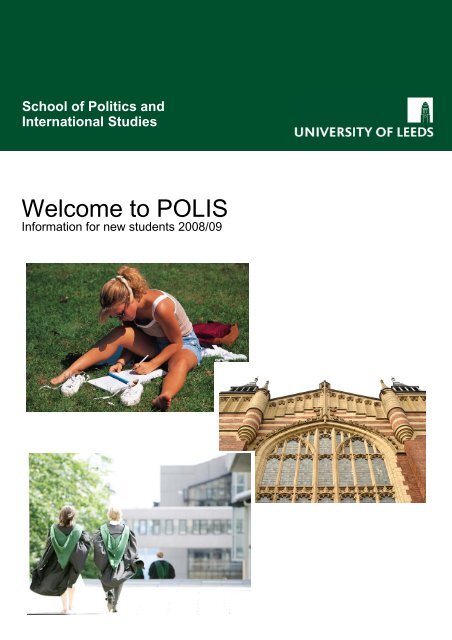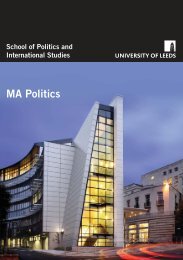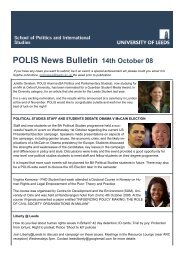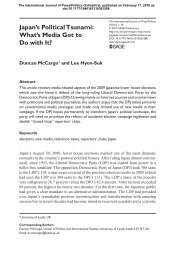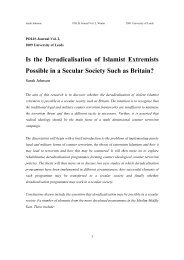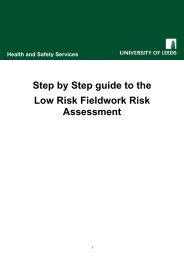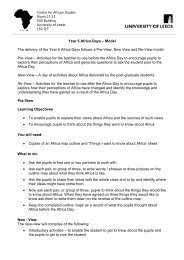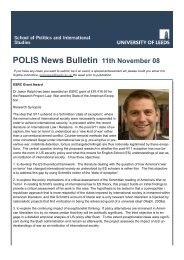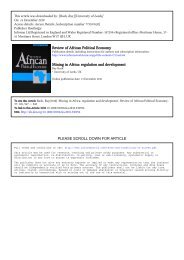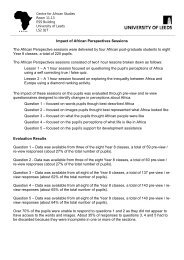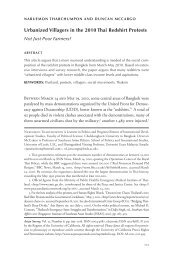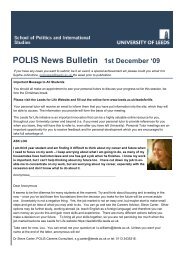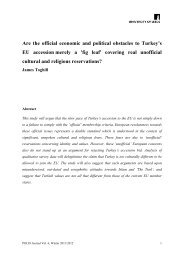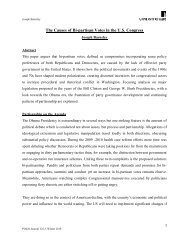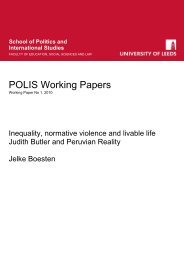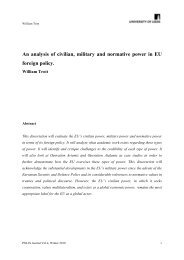Welcome to POLIS - School of Politics International Studies ...
Welcome to POLIS - School of Politics International Studies ...
Welcome to POLIS - School of Politics International Studies ...
- No tags were found...
You also want an ePaper? Increase the reach of your titles
YUMPU automatically turns print PDFs into web optimized ePapers that Google loves.
WELCOME<strong>Welcome</strong> <strong>to</strong> the <strong>School</strong> <strong>of</strong> <strong>Politics</strong> and <strong>International</strong> <strong>Studies</strong> (<strong>POLIS</strong>). Now that the Alevel results are through or you have made a final decision <strong>to</strong> return <strong>to</strong> studying after abreak, I expect you might be feeling somewhat nervous. What will life at Leeds belike? What sort <strong>of</strong> choices do I have? What do I have <strong>to</strong> do when I get here? Thisbooklet is designed <strong>to</strong> help.Although we hope that this will answer most <strong>of</strong> your initial questions, you should not beafraid <strong>to</strong> ask if you do need any help or advice. Where possible, we have indicatedwho you should contact if we are not be able <strong>to</strong> help. We hope that we have put aprogramme <strong>to</strong>gether for the first week that will be informative and helpful.For the first time, new students will be able <strong>to</strong> enrol on modules before they arrive inLeeds. Please read the booklet and any accompanying advice sheets very carefullybefore deciding which modules <strong>to</strong> take. If you are still unsure then email us onpolisugmodules@leeds.ac.uk . <strong>International</strong> Development students should note thatthey must send us their choice <strong>of</strong> minor programme and allow time for this <strong>to</strong> belogged on <strong>to</strong> the system before choosing their modules.There is an initial meeting on Monday 22nd September in the Environment LectureTheatre F at 10am (see instructions on page 20) and you should ensure that you putthis in your diary.Best wishes.Pr<strong>of</strong> Clive JonesHead <strong>of</strong> <strong>School</strong>This booklet was as accurate as we could make it at the time <strong>of</strong> going <strong>to</strong>press, but the <strong>School</strong> cannot be held responsible for any errors containedtherein.
Things <strong>to</strong> do before you arrive1) Put the following dates in your diary:Monday 22 September10-12 noon Introduction <strong>to</strong> <strong>POLIS</strong>. Environment Lecture Theatre F1-2 pm Meetings with Programme Direc<strong>to</strong>rs2 pm Campus TourEuropean Social Sciences Building 11.14<strong>International</strong> Development Social Sciences Building 11.13<strong>International</strong> Relations Roger Stevens Lecture Theatre 1Political <strong>Studies</strong> Roger Stevens Lecture Theatre 2<strong>Politics</strong> and Parliamentary <strong>Studies</strong> Social Sciences Building 13.08Tuesday 23 September2-4 pm Any Questions?Drop-in surgery sessions with Programme Direc<strong>to</strong>rsEuropean (Social Sciences Building 13.14)<strong>International</strong> Development (Social Sciences Building 12.16)<strong>International</strong> Relations (Botany House 3.02)<strong>Politics</strong> (Social Sciences Building 13.04)PPS (Social Sciences Building 13.22)4 pm Party! Social Sciences 11.13 and11.14Wednesday 24 September10.00-12.30 noon Study Skills Session Roger Stevens Lecture Theatre 20Thursday 25 September9.30-1.30 pm Personal Tu<strong>to</strong>r Group SessionsA great opportunity <strong>to</strong> meet up with othernew students and your personal tu<strong>to</strong>rSee lists for locations2 – 4 pm Peer Men<strong>to</strong>ring Session. A chance for first Roger Stevens Lec Theatre 24years <strong>to</strong> meet existing students for guidance,chat and refreshments.
Friday 26 September10.30-12.00 noon Introduction <strong>to</strong> the Library for people with family names [surnames]beginning A-L. Meet in the Conference Room on level 7 <strong>of</strong> theEdward Boyle library. See appendix for details as <strong>to</strong> how <strong>to</strong> findthe room.2.30-4.00 pm Introduction <strong>to</strong> the Library for people with family names [surnames]beginning M-Z. Meet in the Conference Room on level 7 <strong>of</strong> theEdward Boyle library. See appendix for details as <strong>to</strong> how <strong>to</strong> findthe room.2) Make sure that you follow the advice in the University <strong>Welcome</strong> GuideThis gives you a useful checklist <strong>of</strong> things <strong>to</strong> do and it is usually issued once theUniversity knows that you intend <strong>to</strong> take up your place. You should have received it by earlySeptember unless you are a clearing candidate. Enquiries should be directed <strong>to</strong> the RegistrationHelpline on 0800 915 0402 (9-5 pm Monday <strong>to</strong> Friday); not <strong>to</strong> the <strong>School</strong>. Clearing candidateswill be sent the information as soon as the University has received confirmation from them thatthey are taking up the place.3) Decide which modules you would like <strong>to</strong> take and enrol onlineSee the separate sheet for your degree programme. This is the first year that first year studentshave been able <strong>to</strong> enrol online, so we hope that you will forgive us if there are any teethingproblems.4) Consider some preliminary readingSee the module details in the appendix. It is not a sensible idea <strong>to</strong> rush out and buy all <strong>of</strong> thesetexts - you will be <strong>to</strong>ld by the module leader which (if any) they recommend for purchase.Whether you do any preliminary reading and how much reading you do is down <strong>to</strong> the individual,but don’t let it become a cause <strong>of</strong> anxiety.
Other things <strong>to</strong> rememberTimetableOnce you have enrolled for your modules online, you need <strong>to</strong> wait until the following day beforeyou attempt <strong>to</strong> print out a timetable [from http://portal.leeds.ac.uk]. The reason that there is a delayis that the details <strong>of</strong> the module enrolments are uploaded on an overnight basisIf your timetable shows a clash, and it is something that the teaching schools can resolve [generallylectures are fixed, so a clash between two lectures is not something that can be sorted], then this willbe done for you. You must ensure that you check the class times before the start <strong>of</strong> teaching just <strong>to</strong>ensure that they have not been changed.If you have a good reason that you can’t make a seminar or tu<strong>to</strong>rial that has been allocated <strong>to</strong> you[generally this would be on account <strong>of</strong> a religious commitment or caring responsibilities] then pleaseemail the <strong>School</strong> on polisugmodules@leeds.ac.uk.Post and MessagesEmailYou should check your university email on a recommendeddaily basis,as this is the preferred method <strong>of</strong> communication formany University messages. If you use an alternative emailprovider then you should make sure that your Universityemail is forwarded <strong>to</strong> that address1. Click the Options Icon.2. Near the <strong>to</strong>p right hand side <strong>of</strong> the screen click on the dropdown menu: "Edit options for:" then select 'Filters'.3. Click on the 'Filters' link then on 'Edit your filter rules'.4. Click on the Forward rule, enter your e-mail address andclick Save.N.B. Check that you have a green tick on the Forward filter,otherwise, click on the red 'X' <strong>to</strong> enable forwarding.Generally speaking you should make enquiries at the <strong>POLIS</strong> Undergraduate Offices (open from 9.30– 12.30 and 1.30 <strong>to</strong> 3.30 weekdays). If you have reason <strong>to</strong> email colleagues in the <strong>School</strong> then youshould quote your year, programme and student number for ease <strong>of</strong> reference.NoticeboardsThere are a number <strong>of</strong> noticeboards around the <strong>School</strong> which are clearly labelled. You should checkthe appropriate ones regularly [at least once a week] for information.PigeonholesThe undergraduate pigeonholes are located in the common room in the Social Sciences Building.Messages from staff and students and internal University mail will be left there for you <strong>to</strong> collect. Youmay also use the pigeonholes <strong>to</strong> leave notes for each other. You should check your pigeonholeon a regular basis (at least weekly).
Learning about IT at LeedsYou will be given some written information <strong>to</strong>enable you <strong>to</strong> become familiar with the basics<strong>of</strong> the Leeds computer system, including e-mail, word processing and the internet.Further documentation can be found at:http://www.leeds.ac.uk/iss/documentation/Handing in workThe deadlines and place for handing in work, and the form that the work should take should beclearly specified in the module handbook. Because the collection <strong>of</strong> essays is extremely timeconsuming for the staff concerned, it is not possible <strong>to</strong> take in essays before the due date. Youshould keep an electronic copy <strong>of</strong> any work handed in <strong>to</strong> the University and obtain a receipt.Students <strong>of</strong>ten complain that they have lost their work because <strong>of</strong> some form <strong>of</strong> computer failure.The University provides space on their systems where you can save your work (the “m” drive) andyou should make a habit <strong>of</strong> keeping copies <strong>of</strong> all <strong>of</strong> your work here. This has the advantage that theUniversity system keeps back up copies so this ensures that your work is always retrievable. Loss<strong>of</strong> work for computer problems is not a valid excuse for lateness when handing in work..Keeping the <strong>School</strong> InformedTrying <strong>to</strong> keep accurate records on all our students is not an easy task! We need <strong>to</strong> keep up <strong>to</strong> datefiles with information on your address, choice <strong>of</strong> modules, exam marks, etc., and we cannot achieveany <strong>of</strong> this without your help and co-operation.Changes <strong>of</strong> any sort should be reported <strong>to</strong> the <strong>School</strong> Office. There are forms outside the <strong>of</strong>fice <strong>to</strong>note a change <strong>of</strong> address [It is also possible <strong>to</strong> change your address online onhttp://portal.leeds.ac.uk and click on student services and admin]You should also let the <strong>of</strong>fice know if you have been ill and unable <strong>to</strong> work so that allowances can bemade if necessary. Full details regarding who you need <strong>to</strong> speak <strong>to</strong> and what you need <strong>to</strong> do are inthe BA handbook which will be given <strong>to</strong> you on your arrival.
Student Representative Committee and the Staff Student CommitteeThe Student Representative Committee is a body <strong>of</strong>students who are elected each year. For furtherinformation see the notice board outside the UG<strong>of</strong>fice, or leave a message for them in the pigeonhole in the <strong>of</strong>fice.The SRC meets on a regular basis and it alsomeets with members <strong>of</strong> <strong>POLIS</strong> staff. This meeting iscalled the Staff/Student Committee. The agenda forthis is set by you, the student. It covers academicand pas<strong>to</strong>ral support and other more generalissues, including the day-<strong>to</strong>-day running <strong>of</strong> the<strong>School</strong>.via their pigeonhole in the <strong>of</strong>fice.Please contact a student representative if you haveany queries or issues you feel should be added <strong>to</strong> ameeting agenda, or you can contact the committeeBeing a representative on the Student Representative Committee /Staff Student Committee is veryworthwhile, so do consider volunteering. It also looks good on your CV.The <strong>POLIS</strong> SocietyThe <strong>POLIS</strong> Society is an elected body <strong>of</strong> <strong>POLIS</strong> student representatives who strive <strong>to</strong> bring<strong>to</strong>gether all students within the <strong>School</strong>, through social events, sports and networking. The <strong>POLIS</strong>Society is a also part <strong>of</strong> Leeds University Union. For further information you can email them onpolissoc@gmail.com, or alternatively on Facebook at “The Official LUU <strong>POLIS</strong> Society.”Peer Men<strong>to</strong>ringThe Peer Men<strong>to</strong>ring Scheme was set up in order <strong>to</strong> make the transition from school, or college assmooth as possible. Experienced students volunteer <strong>to</strong> become men<strong>to</strong>rs and have attendedtraining <strong>to</strong> give support and encouragement in your first few months so that you settle well in<strong>to</strong>your new life at Leeds. You will receive an application form <strong>to</strong> be a peer mentee in your welcomepack along with an information booklet. If you wish <strong>to</strong> become a mentee and we hope you do,please return the form <strong>to</strong> us as soon as possible. We will look forward <strong>to</strong> seeing you at our socialon Thursday 2-4pm in Roger Stevens Lecture Theatre 24 where you will meet your new men<strong>to</strong>rs.7
The University wants all taught students <strong>to</strong> get the very best out <strong>of</strong> the whole experience <strong>of</strong> coming<strong>to</strong> Leeds <strong>to</strong> study. With this in mind, a new interactive website, ‘Leeds for Life’(www.leeds.ac.uk/leedsforlife) provides information and links <strong>to</strong> resources which will help you <strong>to</strong>get the best out <strong>of</strong> your degree and student life.Leeds for Life can help you have an enjoyable and successful academic experience, ensuring youmake the most <strong>of</strong> your degree work, as well as the time outside and beyond your study.Check out the website and discuss this with your Personal Tu<strong>to</strong>r.Disabled Student SupportThe University <strong>of</strong> Leeds is committed <strong>to</strong> providing high-quality advice and support for studentswho:• are deaf, hard <strong>of</strong> hearing, blind or partially-sighted• have a physical or mobility impairment• have a long-term medical condition or mental health difficulty• have a specific learning difficulty (for example, dyslexia)• have a developmental learning disability (for example, Asperger Syndrome or ADHD)• have a combination <strong>of</strong> these.Our Disability Team is based within the University’s Equality Service.What services are available?Disabled students can access a range <strong>of</strong> support services, subject <strong>to</strong> availability and suitability,without applying for additional funding, including:• disabled students’ early induction programme• handouts and lecture presentations in advance• access <strong>to</strong> campus-based computers with assistive technology (including text-<strong>to</strong>speech,mind-mapping and magnification s<strong>of</strong>tware)• equipment loan• adaptations <strong>to</strong> University accommodation• modified examination arrangements or extended library loans• information and support from the Disability Team, including drop-in and guidancesessions.The Disability Team can either arrange these services for you or, in some cases, point you in thedirection <strong>of</strong> the appropriate part <strong>of</strong> the University.To access a range <strong>of</strong> other support services, you are likely <strong>to</strong> need <strong>to</strong> apply for additional funding.These services include:• an assessment <strong>of</strong> academic support needs• one-<strong>to</strong>-one learning strategy support• transcription services for blind or partially-sighted students (<strong>to</strong> convert academicinformation in<strong>to</strong> accessible formats, including braille, large print, e-text and audio)• Personal Assistant and/or Notetaker support• sign language interpreting.
Can I receive help with funding for support services?Disabled Students’ Allowance (DSA) funding is available <strong>to</strong> most disabled and dyslexic studentsfrom the UK. This funding is intended <strong>to</strong> assist with disability-related costs resulting from yourcourse <strong>of</strong> study. It is not a loan, nor is it means tested. For most students, this funding will comefrom your Local Authority or funding body. We strongly recommend that you start applying forDisabled Students’ Allowance early because the process can take a while. The Disability Teamcan advise you about sources <strong>of</strong> funding or help you fill in the application forms.For international students, particularly those from outside the European Economic Area, eligibilityfor funding is complex. We advise you <strong>to</strong> contact us as soon as possible <strong>to</strong> discuss the supportand funding you may need whilst studying at Leeds. If you are being sponsored, financialassistance may be available from your sponsor. We can also provide your sponsor with moreinformation about these costs, if you would find this helpful.What if I need modified examination arrangements?If you feel you might need some kind <strong>of</strong> modification in your exams (for example, extra time), youshould contact the Disability Team as soon as possible <strong>to</strong> discuss what we can <strong>of</strong>fer. You willneed <strong>to</strong> provide evidence <strong>of</strong> your individual circumstances. The registration deadline for SemesterOne exams is the end <strong>of</strong> Oc<strong>to</strong>ber, and, for Semester Two, the end <strong>of</strong> March.How can I contact the Disability Team?To discuss the support or funding that you might require at Leeds, our contact details are:Telephone: +44 (0)113 343 3927 (Calls via RNID Typetalk are welcome)Textphone: +44 (0)113 343 2616Fax: +44 (0)113 343 3944Email:Website:Post:disability@leeds.ac.ukwww.equality.leeds.ac.ukDisability Team, Equality ServiceUniversity <strong>of</strong> LeedsLeeds LS2 9JTYou do not need <strong>to</strong> wait until you arrive in Leeds before you contact us. In fact, it is helpful if youcontact us as soon as possible <strong>to</strong> enable us <strong>to</strong> arrange your support.9
Appendix 1Key ModulesPIED1100 British <strong>Politics</strong>20 credits semester 2• Is ‘New Labour’ either new or Labour?• Is it Britain’s destiny <strong>to</strong> be always the‘awkward partner’ <strong>of</strong> Europe?• Did Mrs Thatcher save Britain from terminaldecline?• How democratic is Britain?Courtesy <strong>of</strong> the Independent (with thanks)The module aims <strong>to</strong> provide an introduction <strong>to</strong> British politics since 1945, focussing on key debatesabout the changing character and conduct <strong>of</strong> politics; the social and economic context <strong>of</strong> politics;political ideas and party alignments; Britain’s international position and constitutionaldevelopments. Topics covered include: the postwar consensus; the debate about British 'decline';Thatcherism; Blairism and New Labour; Britain and the world in the 20th century; Britain and theEU; social context <strong>of</strong> British politics; mass media and politics; democracy in Britain; constitutionalreform and the future <strong>of</strong> the UK.It provides a foundation for further study <strong>of</strong> British politics at levels 2 and 3, where key themes -including recent political his<strong>to</strong>ry, British central government, local government, elec<strong>to</strong>ral politics,the parties, Britain and Europe - can be studied in depth in specialist modules.Those with little or no knowledge <strong>of</strong> British politics are encouraged <strong>to</strong> take this opportunity <strong>to</strong> boneup. A-level students will find an opportunity <strong>to</strong> extend the breadth and depth <strong>of</strong> their knowledge.Timing Weekly lectures Tues 1-2 Weekly seminars at a time <strong>to</strong> fit your timetable.Module Leader Dr Tim Heppell, email [provisionally] T.Heppell@leeds.ac.ukAssessment 1 x 3 hour examination (100%)Short Reading List:Marsh, D. (et al) (1997) Postwar British <strong>Politics</strong> In Perspective, Cambridge:PolityGamble, A. (1988) The Free Economy and the Strong State, London:MacMillanMorgan, K. (1999) The People’s Peace, Oxford: Oxford University PressKavanagh D and Morris D (1994) Consensus <strong>Politics</strong>10
PIED1211 Making <strong>of</strong> the Global South20 credits semester 1• How do we account for the currentdivide between the Global North andSouth?• To what extent is colonialismresponsible for the condition <strong>of</strong> thecontemporary Global South?• What was the relationship betweencolonialism and capitalistindustrialisation in Europe?• What impact did the transatlantic slavetrade have on Africa and the Americas,and on industrial development inEurope?• What was the impact <strong>of</strong> colonialism onwomen and gender relations?• How did colonised peoples resistcolonial rule and seek independence?• Why was socialism attractive <strong>to</strong> many post-independence governments?• What are the enduring legacies <strong>of</strong> colonialism in the contemporary world?These are some <strong>of</strong> the questions addressed in this module. It provides a political andeconomic his<strong>to</strong>ry <strong>of</strong> colonialism in the Americas, Africa and Asia. It aims <strong>to</strong> provoke reflection onthe relationship between colonialism and capitalist development and the extent <strong>to</strong> which currentglobal inequalities are outcomes <strong>of</strong> the colonial past. Two major issues are explored throughout:the impact <strong>of</strong> colonial rule on socio-economic development in each region; and the relationshipbetween colonialism and European industrialisation. The module also explores contemporarylegacies <strong>of</strong> the colonial past, such as the ‘fast-track land reform’ programme in Zimbabwe’. Videomaterial is used both in lectures and <strong>to</strong> facilitate seminar discussion.Timing Weekly lectures Monday 10-11 Weekly seminars at a time <strong>to</strong> fit your timetable.Module Leader Dr Bina Fernandez, email: [provisionally] B.Fernandez@leeds.ac.uk Assessment1 essay <strong>of</strong> 3000 words (50%), 1 x 2 hour exam (50%)Short Reading List:Tim Allen and Alan Thomas (eds.), 2000, Poverty and Development in<strong>to</strong> the 21 st CenturyBernard Waites, 1999, Europe and the Third World: From Colonisation <strong>to</strong> Decolonisation, c.1500-1998Basings<strong>to</strong>ke : MacmillanEric Wolf, 1997 (2 nd . edition), Europe and the People Without His<strong>to</strong>ry ,11
PIED1200 Contemporary Development Issues20 credits semester 2Aims and Objectives <strong>of</strong> the ModuleIn this module we will look at developmentissues using the Millennium Development Goals(MDGs), which form the major currentinternational development agenda, as a steppings<strong>to</strong>ne. Contemporary issues such as conflict,disease, hunger, education, and environmentalsustainability will be discussed from adevelopment perspective. Concepts such aspoverty, famine, trade justice, debt, gender, andhuman security are introduced and used ascritical <strong>to</strong>ols <strong>to</strong> assess major challenges <strong>to</strong>development in general, and the MDG agenda inparticular. Lectures are provided by experts inthe respective subject areas. In weeklyseminars, students explore the discussed issuesthrough their own research and will use newsclippings <strong>to</strong> explore current affairs in international development and <strong>to</strong> critically examine how oursociety thinks about development.Timing Weekly lectures Thursday 10-11 Weekly seminars at a time <strong>to</strong> fit your timetable.Module Leader Dr Jelke BoestenAssessment 1 essay <strong>of</strong> 3000 words plus 1 x 2 hour examShort Reading List:Allen. T. and Thomas, A. 2000, Poverty and Development in the 21 st Century, Oxford: OUPDesai, V. and Potter, R.B. 2002 The Companion <strong>to</strong> Development <strong>Studies</strong>, London: Arnold.Kothari, U. and Minogue, M. (eds), 2002, Development Theory and PracticeSachs W (1992) The Development Dictionary. A Guide <strong>to</strong> Knowledge as Power. London: ZedRoy, A.N. 1999, The Third World in the Age <strong>of</strong> Globalisation, London: Zed BooksTodaro, M. P. 2003, Economic Development in the Third World12
PIED1300 European <strong>Politics</strong>20 credits semester 1• What is the character <strong>of</strong> politics and politicalpower in Europe?• What makes political systems different and why?• What are party systems like and are there newpolitical cleavages emerging?• Will Green Parties become more important?• What is the Nature <strong>of</strong> Extreme Right Parties?• Who is more powerful in different Europeanpolitical systems: the Prime Minister, PresidentParliament?The module introduces you <strong>to</strong> the kaleidoscope <strong>of</strong>European <strong>Politics</strong> so that you can begin <strong>to</strong>understand why political systems are different and themain problems that democracies in Europe face. Itconcentrates on France, Germany, Italy andBritain but these four countries will be compared with other Western European countries and withthe new political systems in Eastern Europe.We look at how European countries have become democracies. We will look at the differences inthe power <strong>of</strong> PMs, Presidents and Parliaments. We will examine the social variations amongEuropean countries and how they produce different patterns <strong>of</strong> political parties and ask whethertraditional left-right differences are still important. Are new libertarian/authoritarian cleavageschanging traditional party loyalties.Timing Weekly lectures Wednesday 1-2 Weekly seminars at a time <strong>to</strong> fit your timetable.Module Leader Dr Ed Gouge, room no SSB 13.22, email E.S.Gouge@leeds.ac.uk 343 4404Assessment 1 x 4000 word workbook (50%), 1 x 2000 word essay (30%), one presentation (20%)Short Reading List:P. Hogwood and G.K. Roberts (2 nd . edition 2003) European <strong>Politics</strong> Today (Manchester University Press)M. Donald Hancock et al, (2 nd . edition 1998) <strong>Politics</strong> in Western Europe. (Macmillan)A. Cole, (2 nd . edition 2005) French <strong>Politics</strong> and Society (Prentice Hall)S Gundle and S Parker (eds) (1996) The New Italian Republic From the Fall <strong>of</strong> the Berlin Wall <strong>to</strong> Berlusconi(Routledge)13
PIED1330 Debating Europe20 credits semester 2• What is Europe? Does it matter?• Is Europe heading for ecologicalcatastrophe?• Is the EU (and are its member states)racist?• Is Europe safer now than it was during thecold-war?• Can Europe meet the challenge <strong>of</strong> anaging population?• How true is it <strong>to</strong> say that the EU has‘fundamentally failed its citizens’?Europe is a rapidly changing entity with little agreement about either what it is or where it isheading, with the early years <strong>of</strong> the 21 st Century leading <strong>to</strong> ever more questions about the nature<strong>of</strong> Europe: Is it right that Europe is <strong>of</strong>ten seen as synonymous with the EU? How safe is Europe<strong>to</strong>day? Can the EU ever hope <strong>to</strong> be democratic – and is it relevant anyway? Is Europe heading forecological crisis or are the critics doom mongers? Debating Europe will help you <strong>to</strong> answer suchquestions.The module uses a unique method centred (much as its title suggests) on accessing such issuesthrough staff and student debates, providing a lively and provocative yet informative method <strong>of</strong>accessing a number <strong>of</strong> subjects which pr<strong>of</strong>oundly shape the world within which we all live.Timing Weekly lectures Monday 4-5 Weekly seminars at a time <strong>to</strong> fit your timetable.Module Leader Dr Nick Robinson, room no SSB 13.44, 3434790, email: N.Robinson@leeds.ac.ukAssessment 20 minute group debate with accompanying written report (50%) 1 x 3000 word essay(50%)Short Reading List:Gowland, D., Dunphy, R. and Lythe, C. (2006) The European Mosaic (Harlow: Pearson), 3 rdEdition.Manners, I. (2003) Europe and the World: Between Regional Integration and Globalisation(Basings<strong>to</strong>ke: Palgrave) .Sakwa, R. and Stevens, A. (2006) Contemporary Europe (Basings<strong>to</strong>ke: Macmillan), 2 nd Edition.14
PIED1501 Global <strong>Politics</strong> and theEnvironment20 credits semester 2• Is a system <strong>of</strong> sovereign states conducive <strong>to</strong>environmental cooperation?• What is the extent <strong>of</strong> international cooperationin the "global commons" areas?• Are environmental NGOs a challenge <strong>to</strong>states?• How does economic globalisation influenceenvironmental change?• Can we achieve ‘environmental security’?Everyone is concerned about the environment,but what can we do about it? What hope is there for the future <strong>of</strong> our planet? How can wemanage environmental problems on a global scale? Such questions are addressed in thisintroduction <strong>to</strong> the international relations <strong>of</strong> the environment – one module <strong>of</strong> two in this subjectarea which could collectively add a ‘global environment’ aspect <strong>to</strong> your degree programme, orsimply <strong>of</strong>fer an alternative perspective in a single module. This level one module provides anintroduction <strong>to</strong> the political, legal, economic and spacial dimensions <strong>of</strong> the global commons - thoseareas beyond national jurisdiction and sometimes called the ‘common heritage’ <strong>of</strong> humankind -and the new environmental challenges <strong>to</strong> the management <strong>of</strong> our shared world are introduced inthe context <strong>of</strong> global politics. The module introduces such <strong>to</strong>pics as: the limits <strong>of</strong> the terri<strong>to</strong>rialstate; the legal and political definitions <strong>of</strong> the global commons; international regimes; economicactivity, resources and the environment; and 'sustainable development'.. Interests and insightsestablished through this module at level one can be developed through a related ‘globalenvironment’ module at level three (Global Political Theory and the Environment).Timing Weekly lectures Tuesday 10-11 Weekly seminars at a time <strong>to</strong> fit your timetable.Module Leader Dr Hugh Dyer, email H.C.Dyer@leeds.ac.uk, room no SSB 13.36a 3436840Assessment 1 x 3 hour examinationShort Reading List:DeSombre, Elizabeth R. The Global Environment and World <strong>Politics</strong> (Continuum Press, 2002) [GeographyK-25 DES]Elliott, Lorraine The Global <strong>Politics</strong> <strong>of</strong> the Environment (New York, NY: New York University Press,1998) HDC [<strong>Politics</strong> C-6.9 ELL]Vogler, John The Global Commons: environmental and technological governance (Chichester; New York:J. Wiley & Sons, 2000) [<strong>Politics</strong> Q-0.7 VOG]15
PIED1541/42 Globalisation20 credits semester 1 or 2Are you interested in:• understanding the evolution <strong>of</strong> globalpolitics from the rise <strong>of</strong> the modernstate <strong>to</strong> the present day?• understanding the processes thatare potentially undermining themodern nation-state and why theyare so controversial?• understanding the context <strong>of</strong>America's 'war on terrorism' and thefuture trajec<strong>to</strong>ry <strong>of</strong> global politics?The module provides an introduc<strong>to</strong>ry account <strong>of</strong> globalisation and gives you a firm foundation forfurther study. In weeks 1 <strong>to</strong> 3 you will learn how the modern state system evolved out <strong>of</strong> medievalEurope and how, through a process <strong>of</strong> colonisation and decolonisation it became universalised. Inweeks 4 <strong>to</strong> 5 you will examine the impact <strong>of</strong> the great ideological revolutions <strong>of</strong> modern times, andthe Cold War. In week 6 you will benefit from a workshop on study skills, examination preparationand essay writing. In weeks 7 and 9 you will examine changes in the global political environmentincluding apparent rise <strong>of</strong> a ‘global economy’ and the increased power <strong>of</strong> transnational ac<strong>to</strong>rs. Youwill assess the impact such processes are having on our understanding <strong>of</strong> development, povertyand democracy. The final lectures will examine the nature <strong>of</strong> the backlash against globalisationincluding the nature <strong>of</strong> the 'anti-globalisation movement' and the impact <strong>of</strong> the 'war on terrorism’.Timing Weekly lectures Monday 1-2 Weekly seminars at a time <strong>to</strong> fit your timetable.Module Leader (semester 1and 2) Dr Bradley Evans, room no Botany 3.05, 01133436791, email:B.Evans@leeds.ac.ukAssessment IT and library task (20%), 1 x 3000 word essay (60%), one presentation (20%)Short Reading List:Held and A McGrew (2002) Globalisation/Anti-Globalisation Cambridge:PolityMB Steger (2003) Globalisation: a very short introduction Oxford :OUP16
PIED1511/12 <strong>International</strong> <strong>Politics</strong>20 credits semester 1 or 2Are you interested in understanding:• The main ideas, concepts and philosophies thatinform the contemporary world order?• Why the Cold War ended and what replaced it?• How is foreign policy made?• What role does America play in the ‘New WorldOrder?’• How does ‘globalisation’ affect the way statesbehave?• Are we living in a ‘world society’ or are weexperiencing a ‘clash <strong>of</strong> civilisations’?• Why do academics and politicians differ so muchon the importance attached <strong>to</strong> these and otherissues?In short, are you interested in understanding thecomplex changes currently underway in theinternational system and what this means for politics across the globe? The <strong>International</strong> <strong>Politics</strong>module is specifically designed <strong>to</strong> cover these kinds <strong>of</strong> issues and <strong>to</strong> provide you with anintroduction <strong>to</strong> the concepts that enable you <strong>to</strong> make your own judgements about these centralquestions.Essential for comprehending the background behind the events that dominate our daily news,<strong>International</strong> <strong>Politics</strong> is the key if you want <strong>to</strong> make sense <strong>of</strong> the increasingly globalpolitical world that we all now inhabit.Timing: Weekly lectures Tuesdays 11-12 Weekly seminars at a time <strong>to</strong> fit your timetable.Module Leaders: Dr Naomi Head, email: N.C.Head@leeds.ac.uk; Dr Jason Ralph, room 13.41 ESS Building, 3434429, email: J.G.Ralph@leeds.ac.ukAssessment] Part 1 – 1 x 3000 word mid-semester essay Part 2 - 1 x 3000 word end <strong>of</strong> semester essay.Short Reading List:J Baylis and S Smith (eds.), The Globalisation <strong>of</strong> World <strong>Politics</strong>: An introduction <strong>to</strong> international relations(Oxford OUP, 2001 2 nd Edition)Robert Jackson and Georg Sorensen, Introduction <strong>to</strong> <strong>International</strong> <strong>Politics</strong>: theories and approaches (Oxford:OUP, 2003 2 nd Edition)17
PIED1600 Freedom, Power andDemocracy: an Introduction <strong>to</strong>Political Ideas20 credits semester 1• Do you believe in democracy and freedom?• What do these ideas mean?• Why do you believe in them?• Are they realised in practice?• How does power really operate in our society?• What use are political ideas?If you have ever asked yourself these questions, and want <strong>to</strong> be able <strong>to</strong> debate them moreintelligently, then this is the module for you. You don't have <strong>to</strong> have studied politics before. If youhave, then it will give you the opportunity <strong>to</strong> deepen the knowledge you have already acquired. Thismodule fits well with any other first year elective in politics <strong>to</strong> give you a good grasp <strong>of</strong> debates aboutpolitics and political ideas. It provides a solid foundation for further study in politics and socialscience.Timing: Weekly lectures Monday 4-5 Weekly seminars at a time <strong>to</strong> fit your timetable.Module Leader Dr Ricardo Blaug, room no Social <strong>Studies</strong> 13.33, extn 36663, email:D.R.Blaug@leeds.ac.ukAssessment 2 assessed tu<strong>to</strong>rial presentations, 20% each. One assessed essay <strong>of</strong> 2000 words 60%Short Reading List:A. Arblaster, Democracy (1994) Open University PressB.Goowin (1997) Using Political Ideas, Wiley.N.P.Barry (1995)An Introduction <strong>to</strong> Modern Political Theory, MacmillanM.Ramsay (1997), What’s Wrong with Liberalism? London, Leicester University Press18
PIED1805 Contemporary Africas:His<strong>to</strong>ry, Society and Culture20 credits semester 1• What issues concern Africans in relation <strong>to</strong>political and social development?• What is the importance <strong>of</strong> culture: music,dance, theatre and literature, in relation <strong>to</strong>African identities?• What impact did colonialism and the West haveon Africa?• Are women oppressed in Africa?This module will focus on the his<strong>to</strong>ry, society and culture <strong>of</strong> postcolonial Africa. It is intended <strong>to</strong> bean introduc<strong>to</strong>ry course for students interested in, but not at present necessarily particularlyknowledgeable about, issues in contemporary African societies. By the end <strong>of</strong> the module studentswill have an understanding <strong>of</strong> a range <strong>of</strong> key issues relevant <strong>to</strong> the creation <strong>of</strong> contemporarysocieties in Africa. The module will begin with an overview <strong>of</strong> the recent his<strong>to</strong>ry <strong>of</strong> the continent,and will move on <strong>to</strong> consider key <strong>to</strong>pics such as the arts, development, language, politcs, genderand theology. In order <strong>to</strong> help nurture understanding <strong>of</strong> the range <strong>of</strong> African societies there will bea certain number <strong>of</strong> classes focussing on case studies from particular countries such as Egypt,Tanzania and South Africa.Timing: Weekly lectures Friday 2-3 Weekly seminars at a time <strong>to</strong> fit your timetable.Module Leader Pr<strong>of</strong>essor Jane Plas<strong>to</strong>w, English Workshop Theatre 3434722 email:J.E.Plas<strong>to</strong>w@leeds.ac.ukAssessment 2 essays <strong>of</strong> 3000 wordsShort Reading List:Jean-Francois Bayart, The State in Africa, Longman, 1993Andrea Cornwall, ed, Readings in Gender in Africa, James Currey, 2005John Iliffe, Africans, a his<strong>to</strong>ry <strong>of</strong> the continent, Cambridge University Press, 1995A.M. Mazrui, English in Africa after the Cold War, Cleveden, 2003Zakes Mda, Ways <strong>of</strong> Dying, Oxford University Press, 199519
Appendix 2Key PlacesDuring Intro Week, you might want <strong>to</strong> look around the campus and <strong>to</strong> try <strong>to</strong> find outwhere your lecture and seminar rooms are located. You should also find out whereyour pigeonhole and the noticeboards can be found.
Botany HouseThis used <strong>to</strong> be populated by plant science people, hence thepeculiar name. The main thing <strong>to</strong> remember is that access <strong>to</strong>the building is through the “back” doors opposite the GreatHall. There are two seminar rooms on the first floor and somestaff have <strong>of</strong>fices here.Edward Boyle Library Level 7 Conference roomBotany HouseEnter the Edward Boyle Library (EBL) which is number 6 on the map – note that you will generallyneed your student card <strong>to</strong> enter, and turn left after the turnstiles. Enter the staircase and descend<strong>to</strong> the bot<strong>to</strong>m (Level 7) where you will find the Conference Room. Alternatively, on entering theEBL, take the lift down <strong>to</strong> Level 8. From the lift, turn right and make your way <strong>to</strong> the end <strong>of</strong> theLibrary. A wheelchair lift is available for access <strong>to</strong> the Conference Room. A sign indicating that asession in progress will be lit; if you are late, please enter quietly.Environment LT FIf you stand with your back <strong>to</strong> Botany House, you should hopefully be facingthe entrance <strong>to</strong> Clothworkers Court (see pho<strong>to</strong>). Walk through the brickarch, then through a further arch, and then straight ahead until you see the<strong>School</strong> <strong>of</strong> Earth & Environment in front <strong>of</strong> you. Enter the building. Walkpast Lecture Theatre E (which is downstairs the first room on your left).Carry on down the corridor and through two sets <strong>of</strong> double doors andLecture Theatre F is down a couple <strong>of</strong> stairs <strong>to</strong> the leftRoger StevensNumber 10 on the map overleaf. From the main entrance <strong>to</strong> the Social Sciences building turn leftand go through the red doors at the <strong>to</strong>p <strong>of</strong> the steps. At the end <strong>of</strong> the corridor turn right andalmost immediately left.Social Sciences BuildingThis is the main building as far as the <strong>School</strong> is concerned, although we are also based in BotanyHouse. Room 13.24 is the main point <strong>of</strong> call after the first week (during the introduc<strong>to</strong>ry week youshould go <strong>to</strong> the Help Desk). Various staff have <strong>of</strong>fices in this building and a list will be available.The common room leads <strong>of</strong>f the main staircase at level 13. If you are facing the staff pho<strong>to</strong>graphs,then it is through the door on your left.21
Appendix 3Key Dates2008/09 2009/10 2010/11Start <strong>of</strong> Term 24 Sep 23 Sep 22 SepSemester 1 teaching begins 29 Sep 28 Sep 27 SepEnd <strong>of</strong> term 1 12 Dec 11 Dec 10 Dec(Semester 1 teaching ends)HOLIDAYBeginning <strong>of</strong> term 2 2 Jan 11 Jan 10 JanExamination/Assessment period 12 Jan* - 11 Jan* - 10 Jan* -*Assessed work handed in 23 Jan 22 Jan 21 JanSemester 2 teaching begins 26 Jan 25 Jan 24 JanEnd <strong>of</strong> term 2 20 Mar 19 Mar 8 AprHOLIDAYBeginning <strong>of</strong> term 3 20 Apr 19 Apr 9 MayBank Holidays 4 May 3 May 2 MaySemester 2 teaching ends 8 May 7 May 8 AprRevision Week begins 11 May 10 May 9 MayBank Holidays 25 May- 31 May 30 May26 May 1 June 31 MayExam/Assessment period 18 May*- 17 May*- 16 May*-*Assessed work handed in 5 June 4 June 3 JuneDegree Ceremonies 13 July- 12 July- 11 July-24 July 23 July 22 JulyResits 18 Aug- 17 Aug- 16 Aug-28 Aug 27 Aug 26 AugNote that these dates may be subject <strong>to</strong> change. You are expected <strong>to</strong> be available throughout termtime, for the essay handing in date, and for resits, so please be sure not <strong>to</strong> make otherarrangements, e.g. for holidays, which might clash with your study commitments. If your plannedholiday clashes with a resit (and it has happened), things could be very awkward. You should alsorealise that examinations can take place on Saturdays.22
…………………………………………………………………………………………Has this been useful?Please fill this in and hand it in at any <strong>of</strong> the meetings during the first week. We really wouldappreciate it if you could take the time <strong>to</strong> complete it. ThanksStudent Handbook Evaluation Form (please continue on a separate sheet if youwish)I. Did the handbook arrive in time <strong>to</strong> address your information needs?2. Was it well structured?3. Was it relevant?4. Did it answer your questions fully?5. Has there been anything you needed <strong>to</strong> know about which was missing from thehandbook?6. Any further comments.Please continue on a separate sheet if you wish23
<strong>POLIS</strong> First Year timetable Semester 1MON9 - 10 10 - 11 11 - 12 12 - 1 1 – 2 2 - 3 3 - 4 4 - 5 5 - 6TUEWEDTHUFRI
<strong>POLIS</strong> First Year timetable Semester 2MON9 - 10 10 - 11 11 - 12 12 - 1 1 - 2 2 - 3 3 - 4 4 - 5 5 - 6TUEWEDTHUFRI26
Larger printversions <strong>of</strong> thishandbook areavailable.Telephone the <strong>of</strong>ficeon 0113 343 4382/4384/6780 for acopy.
<strong>POLIS</strong>Room 13.24Social Sciences BuildingUniversity <strong>of</strong> LeedsLeedsLS2 9JT 0113 343 4382/4384Email: polisugmodules@leeds.ac.ukWebsite: http://www.polis.leeds.ac.uk/28


